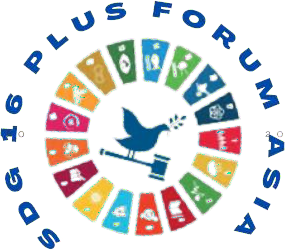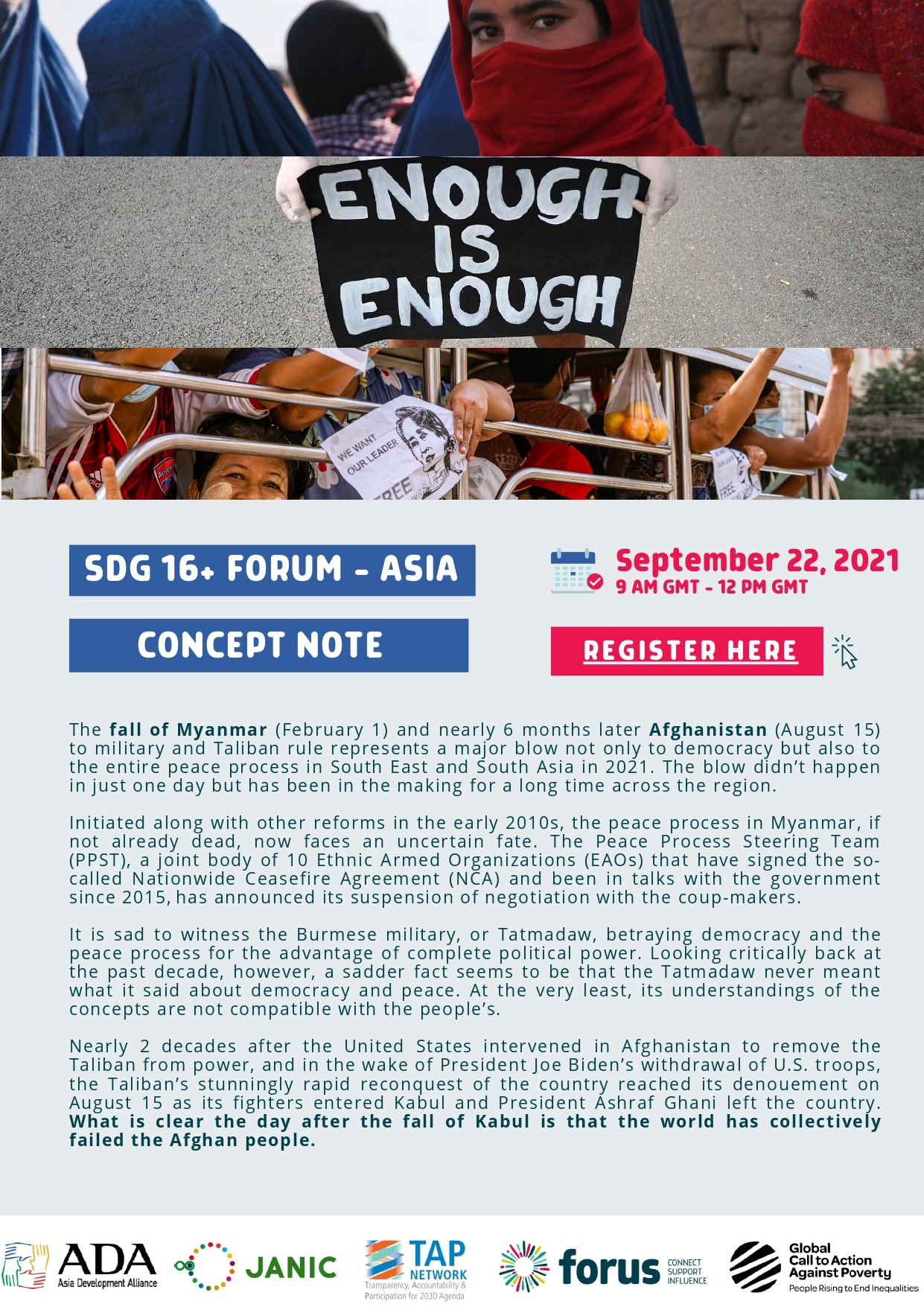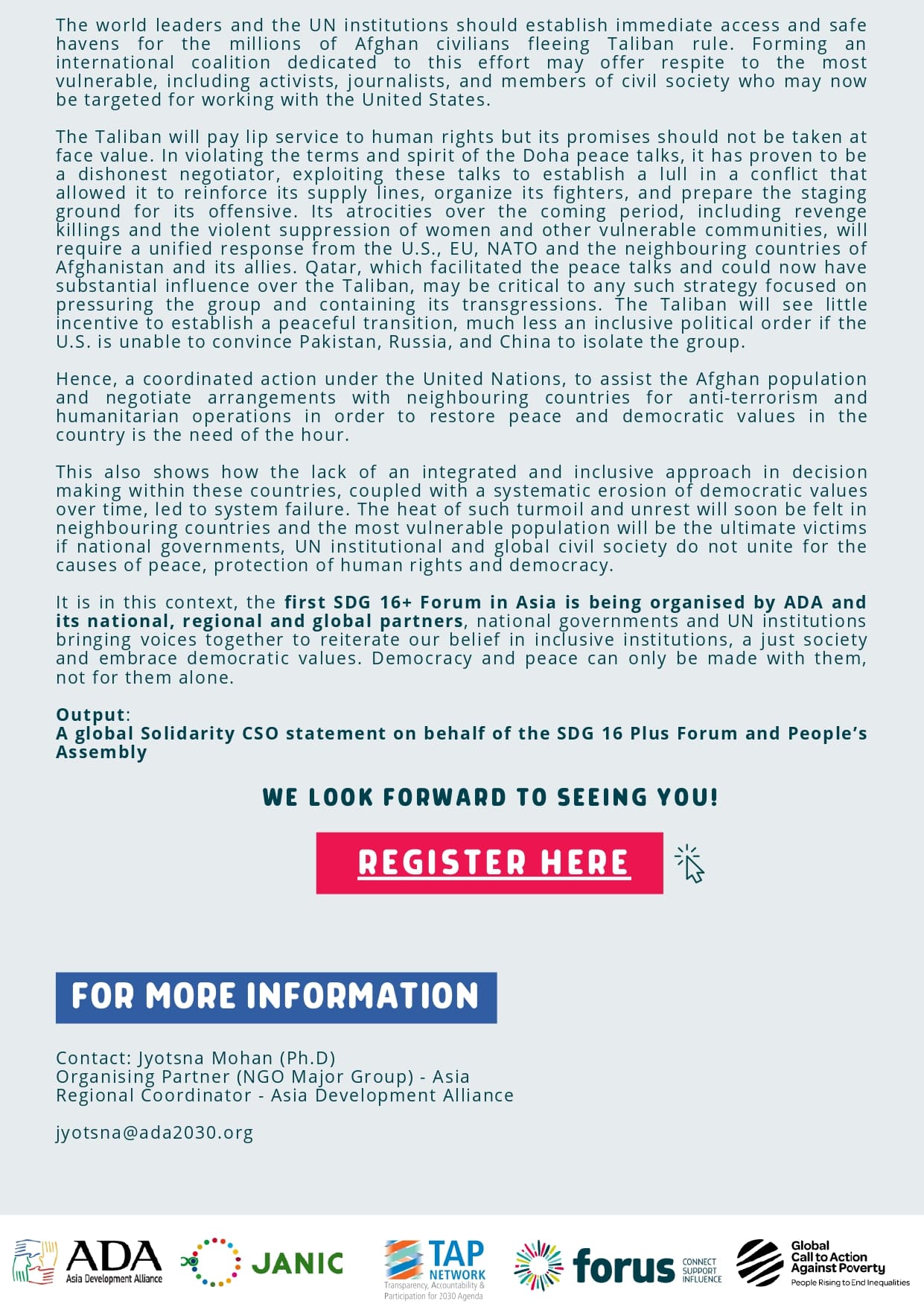SDG 16 Plus Forum - -Asia- 2021
Writer secretariat 21-09-08 06:07 count 51 Reply 0
SDG 16 Plus Forum-Final.pdf (0K)
0 Download DATE: 21-09-08 06:07
Organizers, List of Co-Organisers and Participating Organizations
SDG 16 Plus Forum, Asia
Organised as part of the Global People’s Assembly
22.09.2021
The Declaration of the Asian Forum on SDG 16+
This declaration was drawn up based on wide-ranging presentations and deliberations during the 2021 SDG 16 + Forum, and inputs were provided by participating organisations from across the Asia region and internationally.
The participants of the 2021 SDG 16 + Forum included
Organizer
Co-Organisers
Japan NGO Center for International Cooperation
Participating Organizations
Afghanistan National Education Coalition Organization (ANECO)
Asia Pacific Regional CSO Engagement Mechanism
Finnish Development NGO, Finland
Governance and Peacebuilding Team Leader Bangkok Regional Hub, UNDP
Govt of Malaysia
Human Right Commission, Malaysia
Korea NGO Council for Overseas Development, Republic of Korea
Malaysia CSO-SDG Alliance for SDGs
Bihar Legislative Council, India
MGOS Coordination Mechanism for the HLPF
 SDG 16 Plus Forum -Asia- 2021,
SDG 16 Plus Forum -Asia- 2021,
September 22, 9 AM to 12 PM GMT
Concept Note and Draft Program
The fall of Myanmar (February 1) and nearly 6 months later Afghanistan (August 15) to military and Taliban rule represent a major blow not only to democracy but also to the entire peace process in South East and South Asia in 2021. The blow didn’t happen in just one day, but has been in the making for a long time across the region.
Initiated along with other reforms in the early 2010s, the peace process in Myanmar, if not already dead, now faces an uncertain fate. The Peace Process Steering Team (PPST), a joint body of 10 Ethnic Armed Organizations (EAOs) that have signed the so-called Nationwide Ceasefire Agreement (NCA) and been in talks with the government since 2015, has announced its suspension of negotiation with the coup-makers.
It is sad to witness the Burmese military, or Tatmadaw, betraying democracy and the peace process for the advantage of complete political power. Looking critically back at the past decade, however, a sadder fact seems to be that the Tatmadaw never meant what it said about democracy and peace. At the very least, its understandings of the concepts are not compatible with the people’s.
Nearly 2 decades after the United States intervened in Afghanistan to remove the Taliban from power, and in the wake of President Joe Biden’s withdrawal of U.S. troops, the Taliban’s stunningly rapid reconquest of the country reached its denouement on August 15 as its fighters entered Kabul and President Ashraf Ghani left the country. What is clear the day after the fall of Kabul is that the world has collectively failed the Afghan people.
The world leaders and the UN institutions should establish immediate access and safe havens for the millions of Afghan civilians fleeing Taliban rule. Forming an international coalition dedicated to this effort may offer respite to the most vulnerable, including activists, journalists, and members of civil society who may now be targeted for working with the United States.
The Taliban will pay lip service to human rights but its promises should not be taken at face value. In violating the terms and spirit of the Doha peace talks, it has proven to be a dishonest negotiator, exploiting these talks to establish a lull in conflict that allowed it to reinforce its supply lines, organize its fighters, and prepare the staging ground for its offensive. Its atrocities over the coming period, including revenge killings and the violent suppression of women and other vulnerable communities, will require a UN initiated discussion for human rights protection to facilitate the peace talks with the Taliban.
Hence, a coordinated action under the United Nations, to assist the Afghan population and negotiate arrangements with neighbouring countries for anti-terrorism and humanitarian operations in order to restore peace and democratic values in the country is the need of the hour.
This also shows how the lack of integrated and inclusive approach in decision making within these countries, coupled with a systematic erosion of democratic values over time, led to system failure. The heat of such turmoil and unrest will soon be felt in neighbouring countries and the most vulnerable population will be the ultimate victims if national governments, UN institutional and global civil society do not unite for the causes of peace, protection of human rights and democracy.
It is in this context, the first SDG 16+ Forum in Asia is being organised by ADA and its national, regional and global partners , national governments and UN institutions bringing voices together to reiterate our belief in inclusive institutions, a just society and embrace democratic values. Democracy and peace can only be made with them, not for them alone.
Output:
A global Solidarity CSO statement on behalf of the SDG 16 Plus Forum and People’s Assembly
PROGRAMME:
Opening Session (15 minutes) and Panel 1 (45 Minutes)
Moderator – Mr. Zia Ur Rahman, National Convener of Pakistan Development Alliance
-PDA
Welcome Remarks,
Mr. Hideki Wakabayashi, Chair, Asia Development Alliance and Executive Director, JANIC?Japan NGO Center for International Cooperation)
Key Notes Speaker
Mr. Amitabh Behar, CEO, Oxfam India
(Amitabh Behar, Chief Executive Officer of Oxfam India, is a global civil society leader, and an authority on tackling economic and gender inequality and building citizen participation.
Mr. Behar currently serves as the Vice-Chair of the Board of CIVICUS, a global alliance of civil society organisations and activists dedicated to strengthening citizen action and civil society across the globe. He also serves on the boards of several other organisations, including the Centre for Budget and Governance Accountability, an Indian public policy think tank.
Prior to Oxfam, Mr. Behar was the Executive Director of National Foundation for India and served as the Convener of National Social Watch Coalition and the Co-Chair of Global Call to Action Against Poverty.)
PANEL DISCUSSION- I
Assessment of SDGs16+ in Asia region
PANELLISTS
Each Panellist gets 5-6 minutes to speak about the current situation in Asia with possible solutions to restore peace and democracy, the role of global institutions they represent, besides the UN and human rights institution, civil society, etc. It would be great to come up with possible (3-4) recommendations.
Mr. Ajay Jha, Co-Chair,
Director, CECOEDECON & PAIRVI
Coordinator, MAUSAM (Movement for Advancing Understanding on Sustainability & Mutuality)
Regional Facilitator, Asia Pacific for MGOS at UNEP
Co-Chair, MGOS Coordination Mechanism for the HLPF
Mr. Nicholas Booth,
Governance and Peacebuilding Team Leader Bangkok Regional Hub, UNDP
Mr. Riccardo Mesiano
Sustainable Development Officer, UNESCAP
Mr. Phillip Alston
Former Special Rapporteur on extreme poverty and Human Rights
Ms. Deirdre De BURCA,
Advocacy Co-ordinator, Forus
Mr. John Romano,
Global Coordinator, Transparency, Accountability & Participation (TAP) Network
Ms. Beckie Malay
Former Co-Chair, GCAP, Global
Q&A from the Floor - 10 minutes) PANEL Discussion -II
Sharing County Cases including Good Practices – 60 Minutes
Moderator – Prof Datuk Dr. Denison Jayasooria, Malaysia CSO-SDG Alliance for
PANELLISTS
Each Panellist gets 5-6. Minutes to speak , especially about the good practices to maintain peace and democracy and good governance in their respective countries with their specific roles as parliamentarian, academicians, civil society , with possible national level 3-4 recommendations each
Hon Dato Saifuddin Abdullah
Foreign Minister Govt of Malaysia.
Prof. Sanjay Paswan,
Former Union Minister & Member of Legislative Council, India
Mr Jerald Joseph
Human Rights Commissioner, Malaysia
Ms. Kaisha Atakhanova
ARGO, Kazakhstan
Ms. Shin
KCOC, S.Korea
Mr. Jan Mohammad
Afghanistan
Ms. Khin Oh
Myanmar
Mr. Rilli Lappalainen
FINGO-Finland
Q&A from the Floor - 10 minutes) PANEL -III
Strategic Actions to Accelerate SDG16+ in Asia – 60 Minutes
Ms. Wardarina
Programme Officer of Feminist Development Justice and Breaking Out of Marginalization
Asia Pacific Forum on Women, Law and Development (APWLD)
Co-chair of Asia Pacific Regional CSO Engagement Mechanism (AP-RCEM)
Moderator – Daya Sagar Shreshtha, Focal Point, Focal Point-South and South West Asia and Member-Regional Coordination Committee, Asia-Pacific Regional CSOs Engagement Mechanism (AP-RCEM)
This interactive session aims at wider discussion based on the deliberations in the previous sessions and additional inputs. Each sub-group will be given 25 minutes, ans online jam board to put the points, regarding the current satiation in Asia with special focus on Myanmar and Afghanistan , and the key recommendations from each group. The group will also assign a rapporteur who would make presentation in the plenary, based on which the draft statement will be prepared by the organisers and shared by the moderator of Panel III.
- Presentation from Global and regional Institutions – 05 Minutes
- Presentation from South and South West Asia – 05 mins
- Presentation from Regional Group – 05 mins
- Presentation from National groups – 05 minutes Reading of the draft Statement by the moderatos – 7 minutes
Closing Remarks and Vote of Thanks Ms. Jamila Asanova
ADA Co-Chair and Director, ARGO, Kazakhstan




